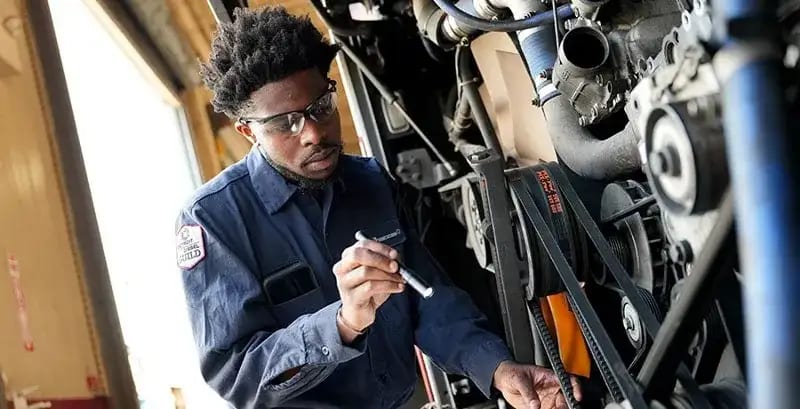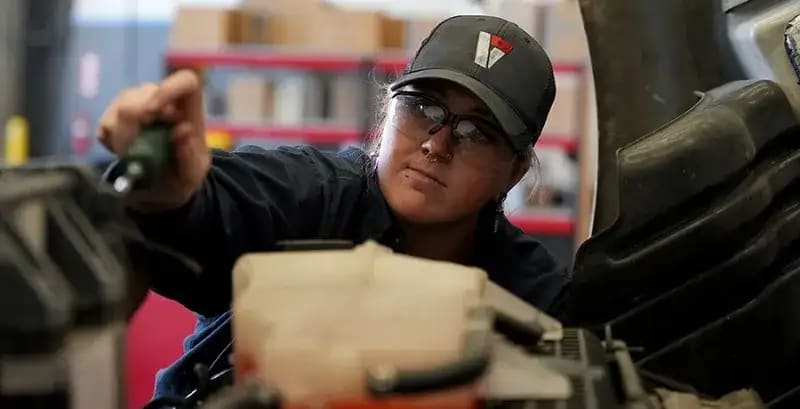Gain skills that can prepare you to work on equipment ranging from big trucks and corporate fleets to farm equipment and oil rigs! 1 The 45-week Diesel Technology program can help.7 When you enroll, you’ll take courses that were created with input from some of the world’s leading manufacturers, and upon graduation, we’ll help you search for entry-level roles in the industry!
Diesel engines power some of the biggest players in our economy. From construction to agriculture, a vast number of industries rely on diesel to keep them running.
In fact, there are more than 26,000 estimated average annual job openings in the United States for bus and truck mechanics and diesel engine specialists, according to the Bureau of Labor Statistics (BLS).43
Explore the variety of careers that graduating from diesel technician school can lead to,1 what diesel jobs require and how you can set yourself apart when looking for a job.
What Is a Diesel Mechanic?
Diesel mechanics work with various types of heavy equipment, which can include everything from farm machinery and construction vehicles to power generators and even some personal vehicles.
Their expertise often extends beyond just engine repair; they are also skilled in diagnosing and fixing complex systems involving hydraulics, brake systems, and transmissions. Diesel mechanics frequently use specialized tools and diagnostic software to identify issues, ensuring that vehicles and machinery operate safely and at peak performance.
This role requires strong problem-solving skills, attention to detail, and a deep understanding of mechanical principles. Diesel mechanics are crucial to industries reliant on heavy machinery, as they help minimize downtime and keep essential equipment running smoothly.
Benefits of Being a Diesel Mechanic
Diesel engines power some of the most important players in our economy. From construction to agriculture, a vast number of industries rely on diesel engines to keep them running.
In fact, there will be more than 26,000 estimated average annual job openings in the United States for bus and truck mechanics and diesel engine specialists, according to the Bureau of Labor Statistics (BLS).43
Aside from the demand, other benefits of diesel mechanic careers include:
- Transferrable skills
- Opportunities to try new things
- Collaborative work environment
- Doing something that matters
Keep reading to learn more about job opportunities for diesel mechanics, what diesel jobs require and how you can set yourself apart when looking for one.
Types of Diesel Mechanic Jobs
Diesel mechanics play a vital role in maintaining America’s transportation and energy infrastructure. Our grads are prepared to pursue entry-level roles. As with any industry, over time, technicians may be able to advance in their careers with experience and hard work.77
Diesel mechanics can be found in a variety of industries, including:
Trucking and Transportation
One of the most popular industries that diesel technicians go into is trucking and transportation. Many techs are employed by trucking companies and transportation authorities. These jobs typically focus on maintenance and repair of semitrucks, heavy trucks, buses and construction vehicles.
State and Local Governments
Many entry-level diesel mechanics work for government departments. In these roles, mechanics may be assigned to various responsibilities like support for road crews, forestry equipment maintenance, and repairs of city vehicles and machinery.

Diesel Automotive Repair & Maintenance
These technicians repair and maintain diesel-powered automobiles. Working in a shop means diesel technicians must be able to keep up in a fast-paced environment and have great teamwork and communication skills.
Mobile Diesel Repair & Maintenance
Mobile diesel mechanics bring the shop to their customers. Rather than traveling to a repair shop, customers can contact a mobile mechanic who can meet them roadside (or wherever they may be) to perform repairs. This is an advanced role that many technicians pursue with experience and hard work.
Power Gen Technician
Power generation technicians are responsible for the inspection, repair, maintenance and modification of internal combustion engines, diesel generators and other gaseous engines. They possess the ability to troubleshoot and repair diesel and gas generators, provide cost estimates for materials and services, use test equipment to determine the cause of breakdowns, and maintain records and files.
“The diesel industry is what keeps the economy going, keeps the world turning.”
Sammy Smythe | UTI Diesel Instructor
Where Diesel Mechanics Work
Diesel mechanic opportunities are often found in places such as:
- Diesel repair shops: These mechanics perform maintenance and repairs on a variety of vehicle models and makes.
- Truck stops: Truck stops and depots that service commercial vehicles are a common place for diesel mechanics to work. To ensure truck drivers stay on track with their delivery schedules, these mechanics must be able to quickly diagnose and repair any issues.
- Field service: Mobile mechanics spend most of their time on the go as they travel to their clients to perform repairs.
- Railroads: Railroad diesel mechanics often work in specialized shops or may travel with the trains they work on to monitor performance and ensure everything runs smoothly.
- Farm or farm equipment dealers: Agricultural mechanics work on various types of farm equipment, such as tractors, planters and tillers both on-site and in dealerships.
- Self-employed: Some diesel mechanics choose to take the self-employed route, owning their own garage or performing repairs for their own client base.
Diesel Mechanic Salary & Diesel Mechanic Job Outlook
If you’re considering a career in this field, you may be wondering, “How much do diesel mechanics make?” According to the U.S. Bureau of Labor Statistics, the median annual salary for diesel service technicians and mechanics was $60,640 in May 2024.29 This means half of diesel technicians earned more and half earned less. Keep in mind that salary depends on several factors, including experience, employer, demand and cost of living in the area.
As more freight is shipped across the country, additional diesel-powered trucks will be needed to carry freight wherever trains and pipelines are not available or economical. In addition, diesel cars and light trucks are becoming more popular and more diesel technicians will be needed to maintain and repair these vehicles.
Top employers for diesel mechanics include organizations in industries such as truck transportation, local government, automotive repair, and equipment rental.
Companies within these sectors depend on skilled diesel mechanics to maintain and repair essential vehicles and machinery. Roles are often available at large transportation companies, repair shops, and construction firms, as well, providing diesel mechanics with various opportunities to specialize or advance within the field.
How To Train To Become a Diesel Mechanic
When it comes to becoming a diesel technician, there aren’t any official requirements for education, certifications or licenses. The only thing most employers require is a high school diploma. However, you can boost your prospects with the right diesel technician school and certifications.
That’s why many aspiring diesel mechanics attend vocational schools that offer specialized training programs in diesel technology, which can last from several months to two years. These programs typically combine classroom instruction with hands-on practice, covering essential topics like engine repair, electrical systems, brake systems and diagnostic techniques.18
Gaining certification through organizations like the National Institute for Automotive Service Excellence (ASE) can also enhance a diesel mechanic's credentials, as ASE certification is often respected and valued by employers. Continuing education is also beneficial, as it helps diesel mechanics stay updated on the latest technology and repair techniques in the evolving diesel industry.
At UTI, diesel mechanic school graduates can take refresher courses to ensure they’re up to date on advancements within the field!
Tips To Help Set Yourself Apart From Other Diesel Technicians
Here are some of the steps you can take to stand out as a diesel technician.
Pursue Higher Education
Many employers increasingly prefer candidates who have completed a postsecondary program at a diesel technician school, according to the BLS.
The Diesel Technology program at Universal Technical Institute (UTI) is designed to teach the fundamentals you need for an entry-level role as a diesel mechanic. In the 45-week Diesel Technology program, you’ll be taught to diagnose and repair diesel fuel systems, perform hydraulic services and receive hands-on training using equipment from leading brands in the industry.18

Obtain Additional Certifications
One of the top certifications that employers look for is Automotive Service Excellence (ASE) certification. It shows that you’re highly qualified and have the expertise and skills necessary to work on diesel engines.
UTI’s Diesel Technology program prepares students to complete ASE examinations. Graduates can even substitute their training for one of the two years of experience required to become ASE certified.
Another way to increase your value as a candidate is through specialized training, like the Manufacturer-Specific Advanced Training (MSAT) programs available to UTI students who have completed the Diesel Technology program.11
These courses have been created in conjunction with leading manufacturers, including Cummins,46 Daimler Truck North America and Peterbilt.15 They’re designed to provide hands-on training and mimic real-world workflows, which can give graduates a competitive advantage when applying for jobs. Plus, students who complete these programs often walk away with manufacturer-specific credentials.
Brush Up on Your Interview Skills
Even if you have the exact qualifications and experience needed for a position, you’ve still got to know how to make good impression in an interview.
UTI’s Career Services team provides interview training, Career Coaching and career development classes that can help you pursue diesel mechanic opportunities.
In the meantime, take a look at this diesel mechanic interview checklist and learn of how you can prepare to put your best foot forward.
Train for a Diesel Career Path at UTI
There’s no shortage of job opportunities for diesel mechanics. Get what you need to pursue them at UTI. Here, you will be taught the skills employers say matter most for diesel technicians.
To learn more about diesel mechanic school at UTI, contact us today. We’ll connect you with an Admissions Representative who can answer your questions and help you get started.

